In light of the ongoing labor crisis, Pollo Tropical and Taco Cabana parent Fiesta Restaurant Group raised the pay of workers, but not permanently.
Since the beginning of May, Fiesta gave workers an additional $1 per hour at nearly 300 company-run Pollo and Taco units. However, CEO Richard Stockinger said the extra $1 per hour is “is just for the time being to get us through this labor crunch.”
“We are going through and evaluating market-by-market to see where we are from our wages, and we will evaluate any additional increases as we get that data,” Stockinger said during the chain’s Q1 earnings call.
Additionally, Pollo’s minimum wage rose to $10 per hour—or $11 with the temporary increase. The wage growth accelerates the timeline required by Florida’s new minimum wage legislation. The law raised the minimum wage to $8.65 per hour on January 1, and will push it to $10 per hour in September. By 2026, the state will be at $15 per hour.
Fiesta is also maximizing retention by giving operations management employees a special bonus incentive that is above the company’s normal bonus target. In terms of recruiting, the brand streamlined its processes to decrease hiring cycle times. In addition, the restaurant company added short-term third-party resources to identify and qualify more candidates. At the store level, Fiesta is reducing promotional and menu complexity and implementing guidelines for maintaining service in locations that have staffing shortages.
“The labor shortage has resulted in reduced hours at select locations, although, the overall reduction in unit opening hours has not yet reached a material level,” Stockinger said. “We will continue to evaluate additional retention strategies and hourly wage compensation levels going forward to ensure we can adequately staff our restaurants.”
Several brands, large and small, have turned to wage increases to counteract the labor crisis. McDonald’s raised its average wage to $13 per hour, while Chipotle raised its average amount to $15 per hour. In addition, P. Terry’s Burger Stand, a 20-unit chain in Texas, raised its minimum wage to $15 per hour in March by implementing marginal increases in menu items and cutting into company profits. On the full-service side, Olive Garden raised wages to $10 per hour for tipped and non-tipped employees, including tipped income. The wage will rise to $11 per hour in January 2022 and $12 per hour in January 2023.
READ MORE: Hiring Challenges Persist for Restaurants, but Changes are Coming
Fiesta believes it can offset the cost of increased wages rates through selective price increases, while still maintaining its value perception, based on internal research and outside pricing analytics consultants. In the past three years, the company said it’s taken lower price increases than its peers. In Q1, Pollo raised prices by 1.2 percent and Taco increased prices by 2.1 percent. In April, Pollo took another 3 percent and Taco took an additional 2 percent.
“We believe that we can take additional pricing action if needed to offset cost pressure to maintain margins at historic levels, while still keeping the strong value perceptions that our customers have for both brands,” said CFO Dirk Montgomery.
In a national survey of 2,500 restaurant operators conducted by the National Restaurant Association, 84 percent said current staffing is lower than pre-pandemic levels, and 90 percent said recruiting and retaining employees will likely be more difficult after the pandemic is over than it was before it began. Because of this, more than half of full-service operators and 42 percent of quick-service operators said they are unable to open at maximum-allowed capacity.
Pollo’s same-store sales dropped 1.4 percent in April compared to 2019 while Taco’s comps decreased 6.5 percent. Both brands are showing encouraging trends through May versus pre-pandemic figures. For instance, Taco’s Cinco de Mayo holiday sales per unit were the second-highest in ten years, and above levels seen in 2020 and 2019.
Fiesta’s consolidated adjusted EBITDA was $12.9 million in Q1, or 8.9 percent of total revenues, which includes a $1.9 million negative impact from Winter Storm Uri in February. Total revenues decreased 1.3 percent to $144.7 million in the first quarter, compared to $146.7 million last year.
Almost all Pollo and Taco dining rooms were open by the end of March. Despite the channel returning, Pollo’s delivery mix exceeded 10 percent, which is a new high. Taco’s delivery channel more than doubled compared to Q1 2020. As of April 4, Pollo had 167 units—138 company-owned and 29 franchised. Taco had 149 stores—143 company-owned and six franchised.
“Both brands are moving toward flat to ’19, with Pollo a little bit ahead of Taco,” Montgomery said. “Pollo basically is flat to ’19 at this point. And as we said, I mean Taco had a fantastic Cinco de Mayo holiday and so May is off to a great start. Obviously, it’s still early in May but they had a fantastic Cinco holiday and week and that puts them on a good trajectory to meet or beat ’19 as we head through the remainder of the year.”




